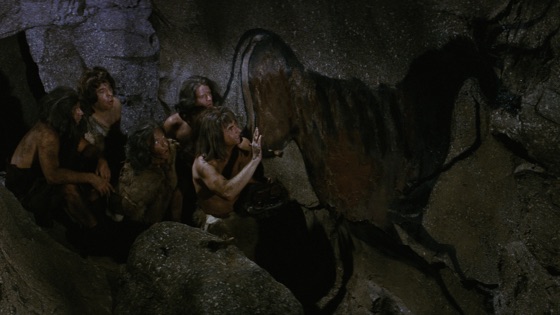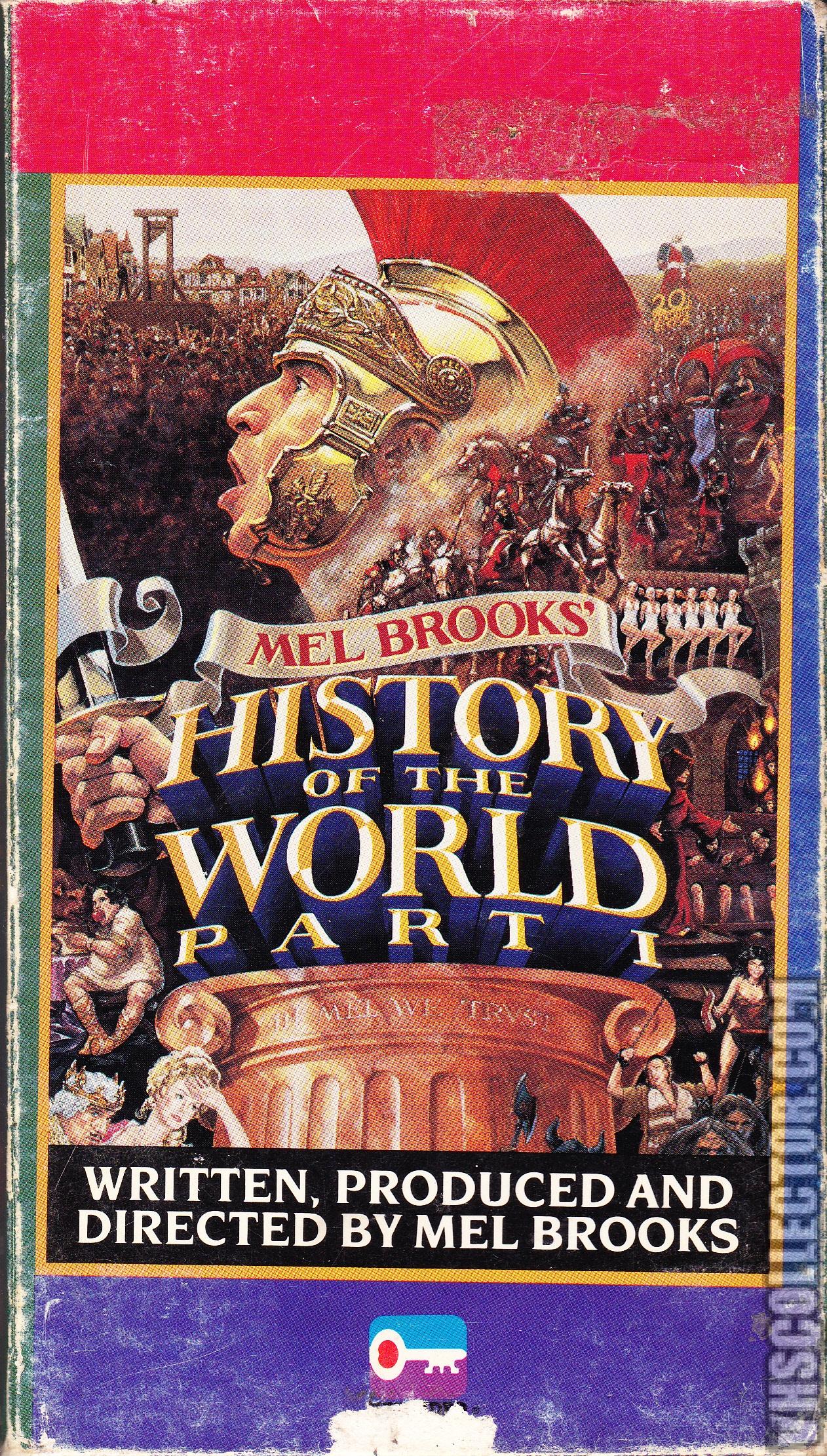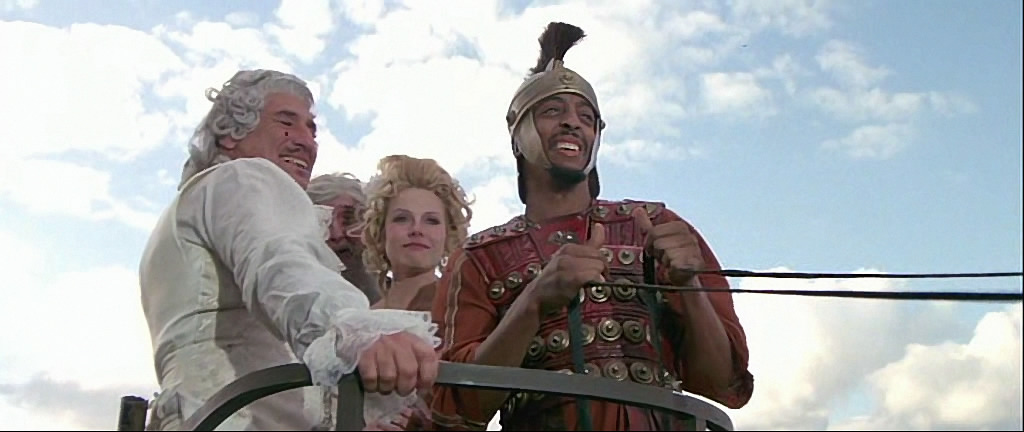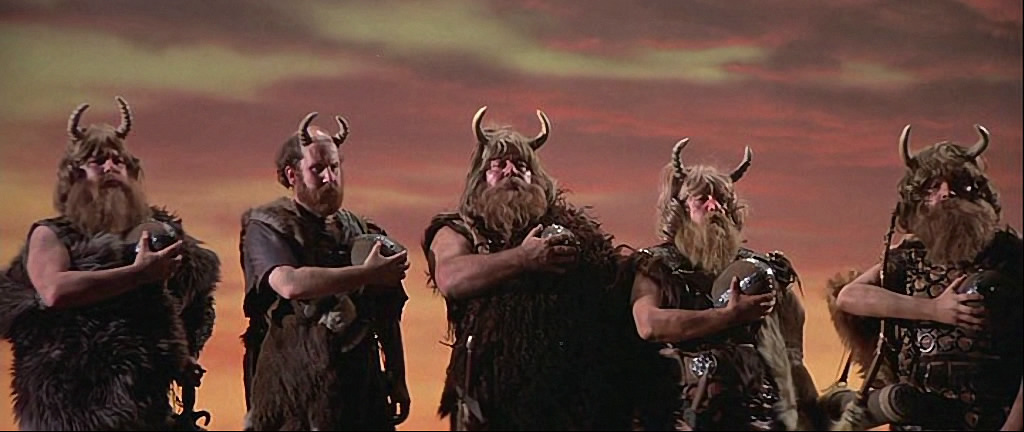The only segment in this movie which was not history related is the jews in space sketch. Moses comicus the stand up philosopher tomás de torquemada king louis xvi and jacques le garçon de pisse the large ensemble cast also features sid caesar shecky greene gregory hines in his film debut charlie callas. History of the world part i is a 1981 american sketch comedy film written produced and directed by mel brooks brooks also stars in the film playing five roles. Parts of history that are spoofed and parodied in this movie include the dawn of man the stone age moses and the ten commandments the roman empire the vikings the spanish inquisition world war ii and the french revolution. Mel brooks brings his one of a kind comic touch to the history of mankind covering events from the old testament to the french revolution in a series of episodic comedy vignettes. The film closes with coming attractions of history of the world part ii that features a rousing orson welles parody anticipating orson welles called jews in space that includes a jaunty theme song.
The final french revolution section is a broad parody of orson welles story. There are loads of familiarly funny gags in the film, which opens today at the Sutton, the Criterion Center and the 34th Street East and other theaters. But the movie is so sour that its humor is often undermined, because so many of the jokes are either mean-spirited or scatological, or both. Women are either explicitly predatory or stupidly decorative, and homosexuals are made fun of regularly. Flamboyantly bad taste, which Mr. Brooks raised to the level of supreme wit in his ''Springtime for Hitler'' number in ''The Producers,'' is this time just bad.
A musical number about the Spanish Inquisition, with Mr. Brooks playing a torturer who merrily abuses Jews, is about as crashingly unfunny as a musical number can be. History of the World, Part I is a 1981 film that provides a history of mankind covering events from the Old Testament to the French Revolution in a series of episodic comedy vignettes. Mel brooks comedy double feature history of the world part 1 robin hood. If brooks never planned on doing a sequel then why did he title it part i. Sid Caesar is a hapless caveman who bumblingly tries art, music, and invention. During the Roman Empire, Brooks himself is a "stand-up philosopher" named Comicus, who ends up playing a significant role in the Last Supper.
During the French Revolution Brooks reappears in dual roles, as the spoiled, lust-driven King Louis XVI, who escapes the guillotine by switching places with a mild-mannered, lookalike urine-bucket servant. Gag coming attractions of the (never-made) History of the World, Part 2 include a skating "Hitler on Ice" and "Jews in Space." Surprise celebrity appearances throughout include John Hurt , Jackie Mason, Bea Arthur, and Hugh Hefner. In general, Brooks' films aren't exactly noted for their political correctness—after all, the director's very first film was about an Adolf Hitler musical. Still, even he wondered if the breakout song in History of the World had finally crossed a line.
"I don't know how audiences are going to react to the Spanish Inquisition sequence," Brooks told Mademoiselle. As he put it, trying to get a laugh out of any scene that involved "Jews on racks" could be "very dangerous." In the end, history repeated itself. After The Producers was released, Jewish leaders contacted Brooks en masse with complaints about the film's brazen Nazi gags. Thanks to that big inquisition number, History of the World, Part 1 garnered a similar reaction. Mel Brooks brings his one-of-a-kind comic touch to the history of mankind covering events from the Old Testament to the French Revolution in a series of episodic comedy vignettes.
Part of the problem with ''History of the World - Part I'' is that it's tired, so tired that the cheerful outrageousness of Mr. Brooks's earlier films has become waxen. The jokes often recall ''The Producers'' and particularly ''Blazing Saddles,'' but never are they as bold as they were the first time around. The enormous cast includes some of Mr. Brooks's most resourceful comic sidekicks, among them Madeline Kahn, Cloris Leachman and the indefatigable Harvey Korman. Perhaps the most important comedy element of "History of the World" is that it doesn't have a linear story.
It is a series of sketches covering the Stone Age, the Old Testament, the Roman Empire, the Spanish Inquisition and the French Revolution, closing with a mock teaser trailer for the nonexistent sequel. Consequently, like the similarly intellectual sketch comedy film "Monty Python's The Meaning of Life" , "History of the World" is freed from all narrative constraints and able to tackle its subject on a more ambitious conceptual level. While "The Meaning of Life" is about philosophy, however, "History of the World" is about history. Brooks casts his comedic eye at humanity's past and, if the sketches are any evidence, seems to view our story as one of big guys keeping little guys down.
Born Gregory Oliver Hines on February 14, 1946, in New York City, he began taking dance lessons at age three and by the time he was six he and his brother Maurice were performing jazz tap at Harlem's Apollo Theater. By 1954, Hines was already on Broadway when he joined the cast of the Broadway musical The Girl in Pink Tights. History of the World Part I is a 1981 sketch comedy film written, directed produced by and starring Mel Brooks. The same thing goes wrong with Brooks's big production number in this movie, "The Inquisition," featuring a song-and-dance team of medieval monks, and a chorus line of nuns who splash in a pool, Busby Berkeley-style.
We're supposed to laugh at the shocking juxtaposition of religious images and Hollywood corn. But Brooks never gives us an additional comic level, one where he's making funny points about the images. When he dresses up like a monk and then dances like Donald O'Connor, that's only funny for a second. If we knew anything about the monk as a comic character, the scene could build. Those are among mine as well, since they contain some of Brooks' most cheerfully vulgar gags. Brooks has never been one to shy away from vulgarity — once famously bragging that his films rise "below vulgarity" — and this perhaps partially explains "Part One"'slukewarm critical reception at the time it was released.
First, even when it isn't making a larger point, it is often quite funny. Brooks' big song-and-dance number about the Spanish Inquisition, for instance, holds up as hysterically tasteless in the tradition of Brooks' "Springtime for Hitler" in "The Producers" even if it doesn't have much depth. Yet some of the crass jokes educate you even as you chuckle. Take the wordplay that uses a 12-letter epithet to reference Oedipus, a character from Greek mythology; if you know the classics, you'll get the joke. History of the World, Part I cast list, listed alphabetically with photos when available.
This list of History of the World, Part I actors includes any History of the World, Part I actresses and all other actors from the film. You can view additional information about each History of the World, Part I actor on this list, such as when and where they were born. To find out more about a particular actor or actress, click on their name and you'll be taken to page with even more details about their acting career. The cast members of History of the World, Part I have been in many other movies, so use this list as a starting point to find actors or actresses that you may not be familiar with.
According to Mel Brooks, the Moses scene was a last minute addition. "Sometimes, you will get very lucky, and the set will give you ideas for jokes", Brooks said in a 2012 interview with the Directors Guild of America. One day, he was gazing out at the scenery that had been built for the caveman segments, when the gears in his head started turning.
"I immediately thought, 'Well, where do I go from here?'" Brooks recalled. Heading into the shoot, his plan was to "skip the Bible and go to Rome." But eventually, he realized that the Stone Age set might enable him to explore another chapter in world history. With a few minor alterations, Brooks converted his fake caves into a mountaintop, and the Moses bit was born.
There also is nothing inherently funny about Jews, Catholics, nuns, blacks, and gays. They can all conceivably provide the makings of comedy, of course, but in "History of the World" Brooks doesn't have the patience to introduce a character and then create a comic situation about him. He introduces the character and expects us to laugh at the character himself. Instead of developing a comic situation around Orthodox Jews, he simply shows us some, complete with beards and hats, their heads stuck through a stockade, and expects us to laugh.
But while we might laugh with Brooks at a comic situation, we have no reason to laugh at people just because of their appearance or religion. If you don't laugh until you cry and possibly even roll in the floor you're not human. This is one of the most hysterically funny films ever made. Turning the Spanish Inquisition into a Musical, and the scene where Moses brings down the 10 Commandments are my absolute favorites.
Mel Brooks making fun of the stone age, the Roman Empire, the Spanish Inquisition and the French Revolution. It has its funny moments, especially when he spoofs one film or the other; but on the whole it's just incredibly dumb and previsible. Guess I'm out of the age where I laugh just because someone farts or rolls a mega joint. From a production standpoint this is one of the more impressive Mel Brooks pictures, lots of those gorgeous matte paintings that would come up later in Spaceballs, and big set-pieces like the "Spanish Inquisition" musical number. Comedically, though, this is Mel's "drunk dad" period, and while it's often very funny, it also feels a little too mean-spirited in parts.
Probably not any more offensive than Blazing Saddles on paper, but where that movie had a very sturdy satirical framework for most of its vulgarity, this feels more like spitballs. Dad comedy legends like Jackie Mason and Henny Youngman get cameos, just in case there was any doubt on this point. "Sometimes, you will get very lucky and the set will give you ideas for jokes," Brooks said in a 2012 interview with the Directors Guild of America. One day, he was gazing out at the scenery that had been built for the caveman segments in History of the World when the gears in his head started turning.
Heading into the shoot, his plan was to "skip the Bible and go to Rome.'" But eventually, he realized that the Stone Age set might enable him to explore another chapter in world history. With a few minor alterations, Brooks converted his faux caves into a mountaintop, and the Moses bit was born. On June 12, 1981—35 years ago today—Mel Brooks's irreverent take on the course of human events opened in theaters. Though critics were thoroughly divided, History of the World, Part 1 grossed a respectable $31.6 million at the box office, and left countless viewers hungry for a sequel. These 11 footnotes should get you ready for a 35th anniversary screening.
The film opened in 484 theatres the same weekend as Raiders of the Lost Ark and Clash of the Titans and finished fourth for the weekend with a gross of $4.8 million, behind Raiders, Clash and Cheech and Chong's Nice Dreams. With a per-screen average of $10,000, it was Brooks' highest opening on a per-screen basis. Despite the strong start, poor word of mouth impacted its box office.
Although it grossed $31.7 million, it was considered a commercial disappointment because the film had been "tracking" well and Brooks' previous films had been so successful. The plot and feel of the film – along with many of the visuals – paid open homage to a huge variety of action and adventure films from the previous fifty years of cinema history. But its childlike charm, blend of violence and humor, and sunny assurance that good would triumph over evil – all of these fit perfectly with the era of Reagan. In this, it signaled once and for all that a new day in American film had dawned. The chapter on the Roman Empire features Brooks as a stand-up comedian named Comicus, who delivers a routine in front of Emperor Nero , only to offend the emperor and be condemned to death.
Hijinks, chronology busting (the scene where they enter the emperor's palace was shot at Caesar's Palace in Los Vegas), and scatological humor ensues. There's also a knock-off musical section , and a trailer for a sequel that features bits about Hitler and a parody of Star Wars (anticipating Brooks' Spaceballs from 1987). Due to the age of the film, we are 'treated' to a Dolby Digital Mono soundtrack here. No plans so far to remix these films into 5.1 as has been done with other older movies. This film is one of Mel Brooks' best works, consisting of several 'eras' in the History of the World from the Stone Age, to the Roman Empire, the French Revolution etc.
Each segment is self contained, and the cast play many separate roles. Although a comedy, this film benefits from many lavish sets which gives the impression that a high budget was enjoyed. One of only 15 people to win the EGOT, legendary funnyman Mel Brooks has excelled on the big screen, the stage and television. Let's take a look back at 12 of his greatest films, ranked worst to best.
Danielle Solzman is native of Louisville, KY, and holds a BA in Public Relations from Northern Kentucky University and a MA in Media Communications from Webster University. She roots for her beloved Kentucky Wildcats, St. Louis Cardinals, Indianapolis Colts, and Boston Celtics. Living less than a mile away from Wrigley Field in Chicago, she is an active reader (sports/entertainment/history/biographies/select fiction) and involved with the Chicago improv scene.
She has previously written for Redbird Rants, Wildcat Blue Nation, and Hidden Remote/Flicksided. From April 2016 through May 2017, her film reviews can be found on Creators. MEL BROOKS'S ''History of the World - Part I'' shows its stripes right from the opening scene. In this Dawn of Man episode, apelike creatures rise up from the mud, learning to stand erect and reaching nobly toward the heavens.
Then they begin bumping, grinding, rutting, gyrating and otherwise slipping back to the slime from whence they came. The movie, like these primitives, delights in being lowdown. Even by prehistoric standards, Mr. Brooks's latest comedy is especially crude. Hopefully the content of the post Article history of the world part 2 cast, what we write can make you understand. Brooks seems to rely on his own spontaneous comic genius in this film, and genius, even when you have it, is not something to be relied upon.
He provides isolated moments that are indeed hilarious, moments that find an inspired image and zing us with it . But as the movie creeps on, we realize that the inspirations are going to be rare, and that Brooks has not bothered to create a framework for the movie or to people it with characters. Mel Brooks's movie "History of the World, Part 1" is a rambling, undisciplined, sometimes embarrassing failure from one of the most gifted comic filmmakers around. Brooks never seems to have a clear idea of the rationale of his movie, so there's no confident narrative impetus to carry it along. His "history" framework doesn't have an approach or point of view; it's basically just a laundry-line for whatever gags he can hang on it.
Along with Woody Allen, Mel Brooks has helped sustain the comedy genre in contemporary films. As Allen has turned more serious, Brooks has gotten more outrageous. He is the sole proprietor of vaudevillian yuks built around sexuality, scatology, and religion.
His elemental energies are unleashed in spades with the release of History of the World — Part I. Brooks panders to the public's continual demand for the kind of bad taste humor that made burlesque popular in its heyday. I'm surprised how heavily the film leans on its time and French Revolution scenes to pad its runtime when it could have easily been a series of sketches a la Monty Python's Meaning of Life. Instead with the exception of the Old Testament and of course the Spanish Inquisition, it just feels tired and dull and drawn out. Also we're gonna have to have a conversation at some point about Brooks's homophobic humor which has continued to age poorly. The other major world leaders depicted here, aside from Louis, are the Roman Emperor Nero and the Spanish Grand Inquisitor Torquemada.
If there is a running theme in Brooks' view of major historical events (at least from Western history; non-Western history isn't featured after the Stone Age sketches), it is that people with money and power have great lives. For people without those things — or who belong to marginalized groups in general —life stinks. "Together we began a fierce collaboration on a song called 'The Inquisition," Brooks recalled. In the final film, Brooks takes center stage during this segment, hamming it up as the grand inquisitor Torquemada. Meanwhile, Graham makes a cameo as one of the Jewish prisoners.
Josephus, a quick-witted Ethiopian slave, is a principal character in the film's Roman Empire segment. Richard Pryor seemed perfect for the part and, to Brooks's delight, he accepted the role. Unfortunately, though, a terrible accident kept him out of the movie. On June 9, 1980, less than a month after History of the World began production, the comic lit himself ablaze while freebasing cocaine and had to be hospitalized. At the suggestion of Madeline Kahn , Brooks handed the role to tap dancer Gregory Hines.


























